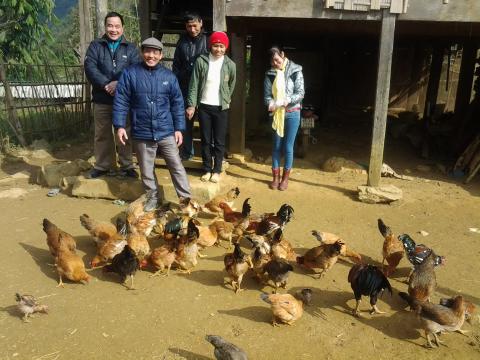Successfully raising chickens in tough climate area

By Thuong Thuong, Mai Chau Gift Catalogue
Receiving 300 newly hatched chickens gave Ha Thi Dong mixed feelings. “I was nervous as the chickens were too small, just one-day old. They seemed to have very little chance of survival in an area with utterly adverse weather," recalls Dong.
Together with Dong, eight other households were also selected to be role models for their community in how to raise chickens effectively. They were equipped with knowledge, skills and techniques related to raising chickens.
“We’ve also learned how to water and vaccinate chickens and keep the henhouses clean, which we have never known of before," says Dong.
The role model households are among as many as 48 poorest families living in a mountainous village in Mai Chau province who were provided with chickens for breeding as part of World Vision’s Gift Catalogue Livelihood Initiatives project in 2014.
The recipients were then invited to enrol in a local study tour on how to nurse the chickens, in which they also had a chance to practice on the spot. Besides technical supports, they received chicken feed and troughs as well.
“Thanks to the hands-on learnings, we’ve successfully kept the chickens healthy during the crucial period when they were from 1 to 21 days old”, says Dong.
Those healthy chickens were then re-distributed among 48 households for them to continue feeding. Five months later, most of the households were able to raise their income by 1 to 3 million dong (USD $50-150) per month from selling the chickens.
“Since we started this model, our children have had eggs and meat for their everyday meals. They are very much healthier now”, says Dong. “After a brood is sold, we keep several hens and a couple of cocks as breeders. That helps us save money because we no longer have to buy new chickens for next breeding round,” says Dong
Ha Thanh Huan, Deputy Head of the veterinary station in Mai Chau province, says, “Before, most households would raise chickens and other animals following traditional methods, unaware of the need to keep henhouses hygienic or vaccinate the chickens at the very beginning stage of their lives. This was the main reason why emerging epidemic would expand very fast, killing almost all animals, especially chickens.”
Witnessing the positive results of this model, World Vision has decided to support 216 more poor households in the community with bred chickens.
“This model is very suitable for the poor villagers in my community, who have very little or no savings," says Kha Van Liem, Vice president of Pu Bin People’s Committee. “This is indeed an effective way for them to escape poverty sustainably."